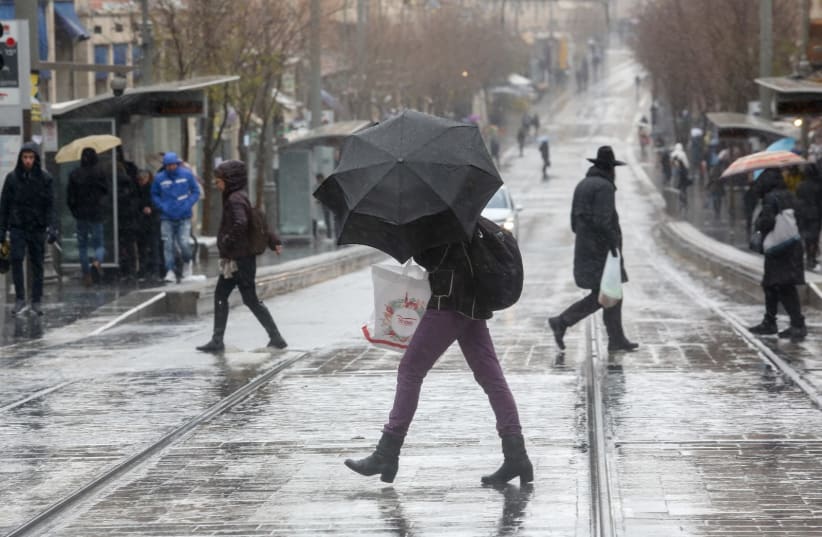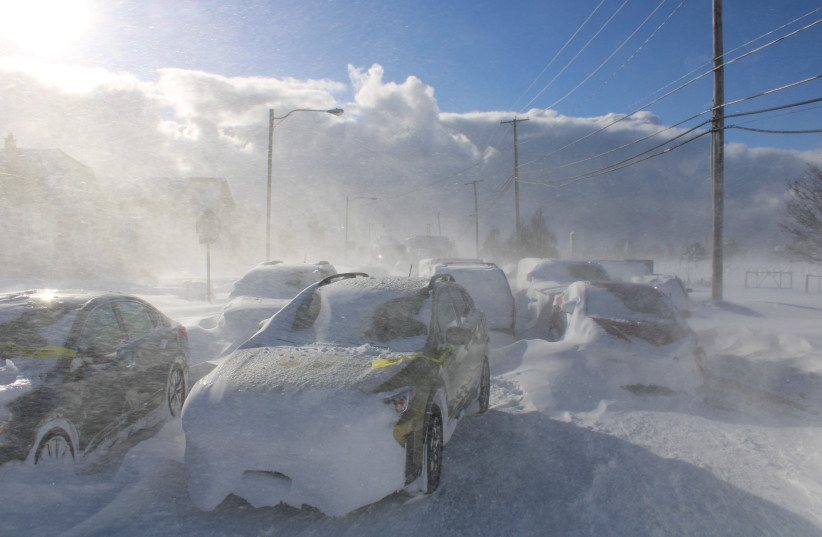Israel’s clothing shops are selling their goods at rock-bottom prices, people are walking around without coats, and sales of umbrellas are plummeting. At the same time, just a few weeks ago, the city of Buffalo in New York State was buried under snow, but New York City has had no snow yet. California, which has suffered for years from dryness and forest fires, was recently flooded.
The Meteorology Service said it was Israel’s driest winter in 60 years.
What is going on? You can blame it on gasoline-powered vehicles, melting glaciers at Earth’s poles and gassy cows, but it’s much more complicated than that.
Although last year we had substantial precipitation, Israeli climate experts and meteorologists are certainly worried that this year’s rainfall has been meager, with only about four barometric depressions, relatively high temperatures and significant dryness especially in the northeast rather than what usually occurs in the south. February and even March could bring rain, but it’s impossible to predict or depend on this.
Prof. Daniel Rosenfeld, an esteemed researcher at the Hebrew University (HU) of Jerusalem’s Institute of Earth Sciences, told The Jerusalem Post that times of little rain and famine as well as alternating times of abundant water go back to the Bible (the sons of Jacob settling in the Land of Goshen in Egypt).
“Winds arrive that are weaker. Less rain that does fall at the coast reaches the interior of the country, including Jerusalem,” he said. “The few low-pressure systems that arrived at the coast have not proceeded to the interior of the country. There were some in the south but little in the northeast, near the Kinneret.
“The National Water Carrier has usually moved desalinated water from the northeast to the fields in the south such as Kiryat Gat, but now it has switched directions to provide water for agricultural lands in the north. It is normal here that there are dry and wet years, but wet years are getting rarer and temperatures in general are rising.”
“It is normal here that there are dry and wet years, but wet years are getting rarer and temperatures, in general, are rising.”
Professor Daniel Rosenfeld
February and even March could be rainy, Rosenfeld continued. “There is no connection between a dry December or January compared to February and March. It’s like throwing dice – one can’t predict. We have to suit our farms to the lack of adequate rains. But there are some beneficial side effects: Melons watered with salty water produce more sugar, so they are sweeter.”
Israel isn't the only place with an unusual winter
Even in North America, there is less cold air, and temperatures are much higher. Most of the systems were rain and not snow. The New York Times reported that this would be the longest stretch of winter without snow since 1973. “The lack of snowfall, according to Dave Radell, a meteorologist with the National Weather Service of New York, has resulted from the tracks of recent storms: Their centers were north and west of the city, while temperatures were warmer in the five boroughs.”
Buffalo in upper New York State, just 600 km. from Manhattan, was an exception, as it was overwhelmed with 2.6 m. of snow last month. “This was due to the lake effect, as cold air moved over the Great Lakes and collected humidity. The result was heavy snow on Buffalo,” Rosenfeld said. “California has become very dry due to the modulation of waves of atmospheric changes, but there can be exceptional storms as well.”
In India and Bangladesh, there have been heavy floods from the sea. It’s not news anymore, said the HU climatologist. “There will be more hurricanes. Israeli weather is not very violent. We have to worry about less rain. Mediterranean waves could become higher. It would be bad if they eroded the shelf near the coast that protects the coast,” said Rosenfeld.
“We are fortunate that we built large desalination plants, and we are world leaders in this field. Jordan – whose capital Amman gets water just once a week from the authorities – is landlocked, recognized this and in the past year signed an agreement with us and the Emirates that we trade desalinated water for electricity that they send to us from solar-power facilities,” he said. “They have room for this. Even in the Negev, we have less room to spare. The accord, which will soon be implemented, is beneficial to both sides.”
Dr. Shira Raveh-Rubin, principal investigator at the Dynamical Meteorological Group in the department of earth and planetary sciences at the Weizmann Institute of Science in Rehovot, told the Post that one has to differentiate between temperature, which is hotter, and barometric depressions that brings rain in our area. It will certainly become warmer, but the amount of rain is not clear.
“A low-pressure system that comes from Cyprus brings rain to Israel, but this year there were many fewer. We have done research showing that when there are low-pressure systems over Italy and a lot of rain, we have warmer, drier weather. If they have rain for several days, we have unusually hot weather. Britain too is warmer in summer, but it rains there throughout the year. We can have rain only in the winter.”
Raveh-Rubin attended a recent conference on climate in Malta, along with experts from North Africa and Arab countries. “We were all talking about the problem of global warming and climate change.” She said that while Israeli planes used to seed clouds with ice to make them release rain, “it doesn’t work very well and is not economical.”
The Environment and Climate Change portal is produced in cooperation with the Goldman Sonnenfeldt School of Sustainability and Climate Change at Ben-Gurion University of the Negev. The Jerusalem Post maintains all editorial decisions related to the content.

